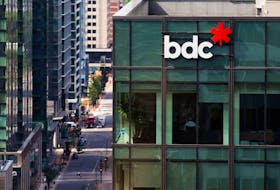Three small businesses spoke to the Financial Post in early April about how they were coping with the coronavirus pandemic and their mood, approximately two weeks into the economic shutdown, was not particularly optimistic.
Since then, a slew of government support programs have been introduced, including the Canadian Emergency Wage Subsidy (CEWS), which offers a 75-per-cent wage subsidy up to $847 per employee per week, numerous interest-free loan options, such as the Canada Emergency Business Account (CEBA), and the Canada Emergency Commercial Rent Assistance (CECRA) that incents landlords to offer rent discounts to tenants.
We caught up with those three businesses again to see how they have been coping a full two months into the current economic crisis.
Business Name: Poppy Barley Inc.
Owners: Kendall and Justine Barber
Location:
Edmonton and Calgary
Brief history: Poppy Barley sells ethically sourced shoes, bags and accessories. It was founded in 2012 by Justine and Kendall Barber, and added its first two employees a year later. Up until that point, it was an online-only store, but in 2017 it opened a retail location in Edmonton. In early 2019, another brick-and-mortar store opened in Calgary.
Number of employees: T he small retail chain had about 50 employees prior to the COVID-19 crisis. After closing both stores on March 18, the owners were forced to reduce staff to about 14 people through layoffs and attrition. The company has managed to hire back three of its employees in the past month.
How COVID-19 has affected business: Poppy Barley’s sales plunged by a whopping 90 per cent in the first three weeks of the crisis. But Justine Barber said sales in April picked up through the shop’s e-commerce site. “There has been a rebound in consumer confidence, I think,” she said. “We are lucky we have always sold online with about 40 per cent of sales coming from our site. We’re getting about half of that right now, so it’s positive.”
How government income support programs have helped … or not:
Poppy Barley applied for a CEBA loan of $40,000 in mid-April and received funds within days of applying.
“We also applied for the wage subsidy, but we haven’t heard back on whether we will actually get it,” Barber said. “We meet the criteria, so I think we should. If we get CEWS, it will help us hire back some of our staff.”
Poppy Barley also received additional financial assistance from a Shopify Capital loan. Applying for the loan was fairly simple, because the store is an existing Shopify client, using its point-of-sale services for both brick-and-mortar stores and its online site. “It took us two hours,” Barber said. “We literally had to press one button. The money was in our account two hours later. And once you start paying down the existing loan, you are eligible for another one.” She compared the process to applying for a COVID-19 emergency loan from the Business Development Bank of Canada: “They have a better interest rate, but the application process has been so onerous, so Shopify seemed like the better source of capital.”
As for CECRA, the rent relief program, the Barbers have yet to hear whether their landlord will apply. “We will participate if they do, and pay our 25 per cent,” she said. “We really believe there has to be shared pain between tenants and landlords.”
Has Poppy Barley considered options to restructure the business? Barber said the business will probably survive for the next few months, and they have done modelling to forecast what would happen if its brick-and-mortar stores remain shut for between six months and two years. “We’ve had conversations with our equity investors around options that we might consider, but it’s too early to go that route.”
Barber said her immediate concern was that Poppy Barley’s manufacturing factory in Mexico is shut down, which means a two-month delay in their fall and winter collections. “We have too much spring and summer inventory and we know our fall collection might only arrive in November, so that worries me.”
***
Business Name: Imprint Marketing
Owner: Halcyon Tan
Location:
Toronto
Brief history: Imprint Marketing is a boutique digital marketing agency that helps create and design digital ad and social media campaigns, and it also offers web-based solutions for companies. Founded in 2011, Tan started the business with her brother and another junior designer out of her home.
Number of employees: Imprint employed 10 people before COVID-19 struck. Three employees have since been laid off and one more employee might have to be.
How COVID-19 has affected revenue:
Imprint’s revenues declined by 40 to 50 per cent between mid-March and early April.
Since then, Tan said revenues have dropped even further and it has been hard to get new clients. “Some of the digital campaigns we were working on have now been axed,” she said. “We are talking to our existing clients about pivoting to e-commerce and helping them through that, because those are the kind of services we provide.” But, she added, clients are being fickle and are afraid to commit to a contract because of the ongoing uncertainty about their own balance sheets. “But we will fight and try to adapt.”
How government income support programs have helped … or not:
Imprint applied for a CEBA loan in the second week of April and received the $40,000 interest-free loan a few days after. “It has helped with salaries. I have to let one more employee go, but this loan has helped keep a few more,” Tan said. “It has to be paid back, which I’m planning for, because I don’t like holding a lot of debt.”
The marketing agency also applied for CEWS, but Tan said she has yet to receive the money although the business qualified for the subsidy. “Once we get that money, it’ll really help with keeping our staff, potentially hiring back some, depending on other factors like our revenue and whether our landlord participates in the rent relief program,” she said.
Tan said the rent for the company’s office space in downtown Toronto is still the biggest cost. Her team has been working from home for the past two months. What’s challenging for small businesses like hers, she said, is that some landlords do not want to apply for the CECRA program, because it means having to cover 25 per cent of a tenant’s rent. “We’re hoping to get more information on the rent relief from our landlord in mid-May.”
Has Imprint considered options to restructure the business? Tan said she has had “some” conversations on that front, but the business is “not there just yet.” Imprint will be able to survive if the shutdown lasts for another month or two, but she said she “doesn’t really have the bandwidth” to think beyond that time frame given that there are so many unknowns.
What other government support programs might help? Anything that might compel landlords to participate in CECRA would be really helpful to Imprint, Tan said. “I’ve heard the same from other business owners. We are not in these office spaces, and we are still having to pay the rent on them.”
***
Business name: UpAuto
Location: Stratford and St. Marys, Ont.
Owner: Michael Carmichael
Number of employees: UpAuto had 50 employees before the COVID-19 crisis hit, but had to let go more than 50 per cent of its staff in March. Carmichael managed to rehire 10 employees in April because of the government’s wage subsidy program.
Brief history: UpAuto is a car dealership with four locations across Ontario: Stratford Subaru, Stratford Nissan, St. Marys Buick GMC and Cargo Auto. Carmichael’s first-ever dealership (GM) has been in operation since the 1950s, and he opened Stratford Subaru in 1992 and Stratford Nissan in 2015. They have remained open as essential businesses for mechanical service and parts through COVID-19, and were allowed to begin in-person sales on May 4.
How COVID-19 has affected revenue: Revenue for this dealership chain was down by just 15 per cent in March 2020 compared to February 2020, but things have deteriorated since then. “We were down more than 50 per cent for the month of April, though I am optimistic for May,” Carmichael said. His biggest concern, beyond the obvious drop in the number of people buying vehicles, is how his inventory is aging “at a rate never seen before. The gap between my book value and market value is exacerbated by the fact that we can’t sell cars.”
How government income support programs have helped … or not: UpAuto applied for and received a loan from the CEBA program. “It provides an incremental buffer for now,” Carmichael said. “With our cash management and expense reduction, we have effectively worked our way through these last seven weeks, but we may have to pursue more loans in the future.”
Carmichael said he is still waiting to receive money from the wage subsidy program, at which point he would potentially hire back even more employees. “We brought 10 back from the (
Canada Emergency Response Benefit
) onto payroll inside the parameters of the CEWS program,” he said. “The wage subsidy program has been incredibly helpful. But we are going to need it until at least September. I’m concerned about the CEWS program being pulled back too far ahead of consumer confidence returning to the economy.”
Has UpAuto considered options to restructure the business? Not at all, Carmichael said, adding that he will probably be able to weather this storm for a while longer. But in addition to worrying about what will likely be a very soft economy, he’s worried about everyone’s mental health. “I believe we are going to be dealing with mental health issues across our entire economy at levels we have not seen before. I am already seeing a lot of that in my own teams.”
What other government support programs might help? Carmichael would like to see a federally funded national job loss fund to underwrite job loss insurance on new and used vehicles. In a letter to Prime Minister Justin Trudeau, he said his idea around the fund will help solve consumer confidence issues. “With this guarantee in place, consumers will have the confidence to make their purchase, thus stimulating the entire automotive ecosystem back to life,” he said in his letter.
Financial Post
• Email: [email protected] | Twitter: VanmalaS
Copyright Postmedia Network Inc., 2020







